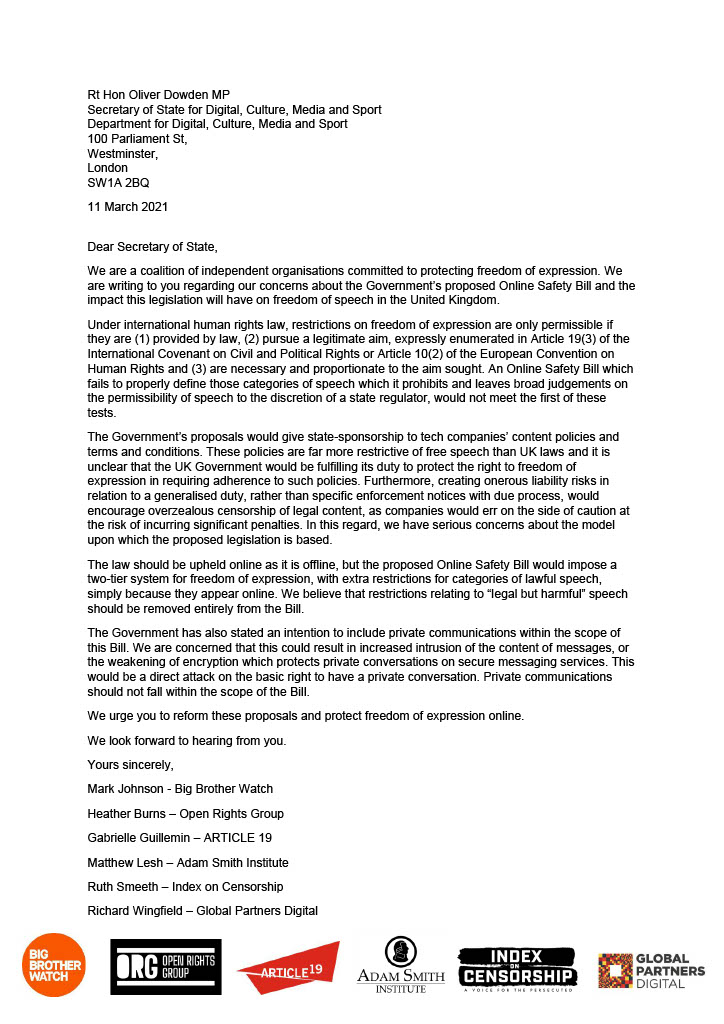Save Online Speech Coalition Launches
Today Open Rights Group has joined our colleagues from Big Brother Watch, the Adam Smith Institute, Article 19, Global Partners Digital, and Index on Censorship in launching a campaign to demand that the Online Safety Bill protects freedom of expression online.
The Save Online Speech Coalition launch was accompanied by an open letter to Oliver Dowden, the Minister for Digital, asking him to support the campaign’s aims.
Effectively and proportionately policing the internet no doubt has its challenges. However, the Government’s plans for the Online Safety Bill – the outcome of the Online Harms White Paper and consultation – will undermine the role of law enforcement and empower private companies to act as speech police.
We want government to ensure that the Online Safety Bill:
- Does not force online service providers to censor lawful speech
- Upholds fundamental human rights, not corporate terms and conditions
- Protects our private conversations online from surveillance
Our open letter to Oliver Dowden

Dear Secretary of State,
We are a coalition of independent organisations committed to protecting freedom of expression. We are writing to you regarding our concerns about the Government’s proposed Online Safety Bill and the impact this legislation will have on freedom of speech in the United Kingdom.
Under international human rights law, restrictions on freedom of expression are only permissible if they are (1) provided by law, (2) pursue a legitimate aim, expressly enumerated in Article 19(3) of the International Covenant on Civil and Political Rights or Article 10(2) of the European Convention on Human Rights and (3) are necessary and proportionate to the aim sought. An Online Safety Bill which fails to properly define those categories of speech which it prohibits and leaves broad judgements on the permissibility of speech to the discretion of a state regulator, would not meet the first of those three tests.
The Government’s proposals would give state-sponsorship to tech companies’ content policies and terms and conditions. These policies are far more restrictive of free speech than UK laws and it is unclear that the UK Government would be fulfilling its duty to protect the right to freedom of expression in requiring adherence to such policies. Furthermore, creating onerous liability risks in relation to a generalised duty, rather than specific enforcement notices with due process, would encourage overzealous censorship of legal content, as companies would err on the side of caution at the risk of incurring significant penalties. In this regard, we have serious concerns about the model upon which the proposed legislation is based.
The law should be upheld online as it is offline, but the proposed Online Safety Bill would impose a two-tier system for freedom of expression, with extra restrictions for categories of lawful speech, simply because they appear online. We believe that restrictions relating to “legal but harmful” speech should be removed entirely from the Bill.
The Government has also stated an intention to include private communications within the scope of this Bill. We are concerned that this could result in increased intrusion of the content of messages, or the weakening of encryption which protects private conversations on secure messaging services. This would be a direct attack on the basic right to have a private conversation. Private communications should not fall within the scope of the Bill.
We urge you to reform these proposals and protect freedom of expression online.
We look forward to hearing from you.
